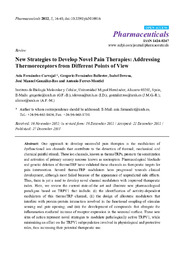Título :
New Strategies to Develop Novel Pain Therapies: Addressing
Thermoreceptors from Different Points of View |
Autor :
Fernández Carvajal, Asia
Fernández-Ballester, Gregorio
Devesa Giner, Isabel 
González Ros, José Manuel
Ferrer-Montiel, Antonio |
Editor :
MDPI |
Departamento:
Departamentos de la UMH::Bioquímica y Biología Molecular |
Fecha de publicación:
2011-12 |
URI :
https://hdl.handle.net/11000/36089 |
Resumen :
first_pageDownload PDFsettingsOrder Article Reprints
Open AccessReview
New Strategies to Develop Novel Pain Therapies: Addressing Thermoreceptors from Different Points of View
by Asia Fernández-Carvajal *,Gregorio Fernández-Ballester,Isabel Devesa,José Manuel González-Ros andAntonio Ferrer-Montiel
Instituto de Biología Molecular y Celular, Universidad Miguel Hernández, Alicante 03202, Spain
*
Author to whom correspondence should be addressed.
Pharmaceuticals 2012, 5(1), 16-48; https://doi.org/10.3390/ph5010016
Submission received: 16 November 2011 / Revised: 16 December 2011 / Accepted: 21 December 2011 / Published: 27 December 2011
(This article belongs to the Special Issue Emerging Pain Targets and Therapy)
Downloadkeyboard_arrow_down Browse Figures Versions Notes
Abstract
One approach to develop successful pain therapies is the modulation of dysfunctional ion channels that contribute to the detection of thermal, mechanical and chemical painful stimuli. These ion channels, known as thermoTRPs, promote the sensitization and activation of primary sensory neurons known as nociceptors. Pharmacological blockade and genetic deletion of thermoTRP have validated these channels as therapeutic targets for pain intervention. Several thermoTRP modulators have progressed towards clinical development, although most failed because of the appearance of unpredicted side effects. Thus, there is yet a need to develop novel channel modulators with improved therapeutic index. Here, we review the current state-of-the art and illustrate new pharmacological paradigms based on TRPV1 that include: (i) the identification of activity-dependent modulators of this thermoTRP channel; (ii) the design of allosteric modulators that interfere with protein-protein interaction involved in the functional coupling of stimulus sensing and gate opening; and (iii) the development of compounds that abrogate the inflammation-mediated increase of receptor expression in the neuronal surface. These new sites of action represent novel strategies to modulate pathologically active TRPV1, while minimizing an effect on the TRPV1 subpopulation involved in physiological and protective roles, thus increasing their potential therapeutic use.
|
Palabras clave/Materias:
TRP channels
nociceptor
pain
analgesia
allosteric modulators
receptor exocytosis
protein-protein interactions
novel targets |
Área de conocimiento :
CDU: Ciencias puras y naturales: Biología: Bioquímica. Biología molecular. Biofísica |
Tipo de documento :
info:eu-repo/semantics/article |
Derechos de acceso:
info:eu-repo/semantics/openAccess
Attribution-NonCommercial-NoDerivatives 4.0 Internacional |
DOI :
https://doi.org/10.3390/ph5010016 |
Publicado en:
Pharmaceuticals 2012, 5(1), 16-48 |
Aparece en las colecciones:
Artículos - Bioquímica y Biología Molecular
|
 La licencia se describe como: Atribución-NonComercial-NoDerivada 4.0 Internacional.
La licencia se describe como: Atribución-NonComercial-NoDerivada 4.0 Internacional.
.png)
